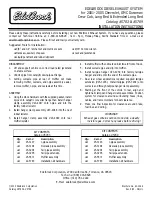
To move the cross bars, loosen the thumb screws located
at the upper edge of each cross bar approximately six
turns, then move the cross bar to the desired position,
keeping the crossbars parallel to the rack frame. Once the
cross bar is in place, retighten the thumb screws to lock
the cross bar into position.
Attempt to move the crossbar again to ensure that it has
properly locked into position.
NOTE:
To help control wind noise when installing the
cross bars make sure that the arrows marked on the front
side of the cross bars are facing the front of the vehicle.
Also, when the cross bars are not in use the notch on the
cross bars should be aligned with the arrows on the side
rails. This will help reduce the amount of wind noise
when the crossbars are not in use.
The tie down holes on the cross bar ends should always
be used to tie down the load. Check the straps frequently
to be sure that the load remains securely attached.
CAUTION!
•
Crossbars should remain equally spaced or parallel
at any luggage rack position for proper function.
Noncompliance could result in damage to the lug-
gage rack, cargo and/or vehicle.
•
To avoid damage to the roof rack and vehicle, do
not exceed the maximum roof rack load capacity of
150 lbs (68 kg). Always distribute heavy loads as
evenly as possible and secure the load appropri-
ately.
•
Long loads which extend over the windshield, such
as wood panels or surfboards, or loads with large
frontal area should be secured to both the front and
rear of the vehicle.
•
Travel at reduced speeds and turn corners carefully
when carrying large or heavy loads on the roof
rack. Wind forces, due to natural causes or nearby
truck traffic, can add sudden upward lift to loads.
This is especially true on large flat loads and may
result in damage to the cargo or your vehicle.
200
UNDERSTANDING THE FEATURES OF YOUR VEHICLE
Summary of Contents for 2007 RS Caravan
Page 2: ......
Page 5: ...INTRODUCTION 5 1...
Page 8: ......
Page 120: ...120 UNDERSTANDING THE FEATURES OF YOUR VEHICLE...
Page 121: ...UNDERSTANDING THE FEATURES OF YOUR VEHICLE 121 3...
Page 122: ...122 UNDERSTANDING THE FEATURES OF YOUR VEHICLE...
Page 202: ......
Page 208: ...INSTRUMENT PANELS AND CONTROLS 208 UNDERSTANDING YOUR INSTRUMENT PANEL...
Page 209: ...BASE INSTRUMENT CLUSTER UNDERSTANDING YOUR INSTRUMENT PANEL 209 4...
Page 210: ...INSTRUMENT CLUSTER WITH TACH 210 UNDERSTANDING YOUR INSTRUMENT PANEL...
Page 306: ......
Page 335: ...STARTING AND OPERATING 335 5...
Page 393: ...Jack Engagement Locations WHAT TO DO IN EMERGENCIES 393 6...
Page 402: ...Jack Engagement Locations 402 WHAT TO DO IN EMERGENCIES...
Page 414: ...2 4L ENGINE Engine Compartment 2 4L Engine 414 MAINTAINING YOUR VEHICLE...
Page 415: ...3 3L 3 8L ENGINES Engine Compartment 3 3L 3 8L Engines MAINTAINING YOUR VEHICLE 415 7...
Page 464: ......
Page 484: ......
Page 494: ......
Page 495: ...INDEX 10...
Page 515: ...NOTES...
Page 516: ...NOTES...
Page 517: ...NOTES...
Page 518: ...NOTES...
Page 519: ...NOTES...
Page 520: ...NOTES...
















































